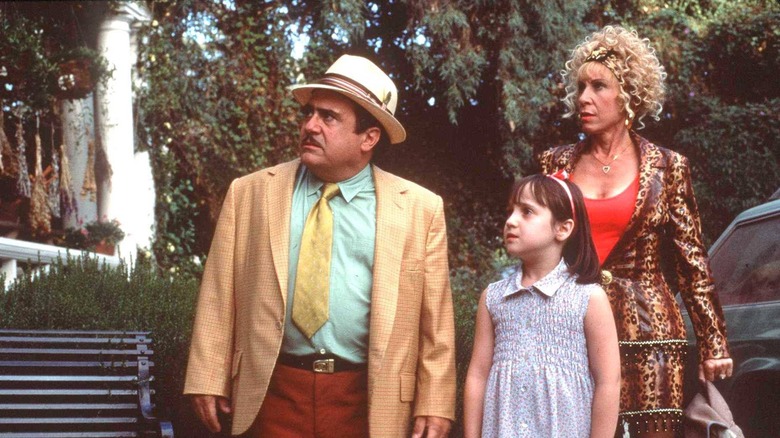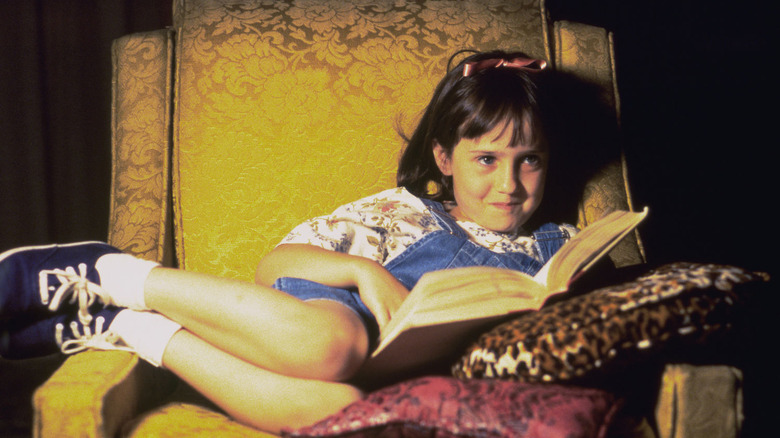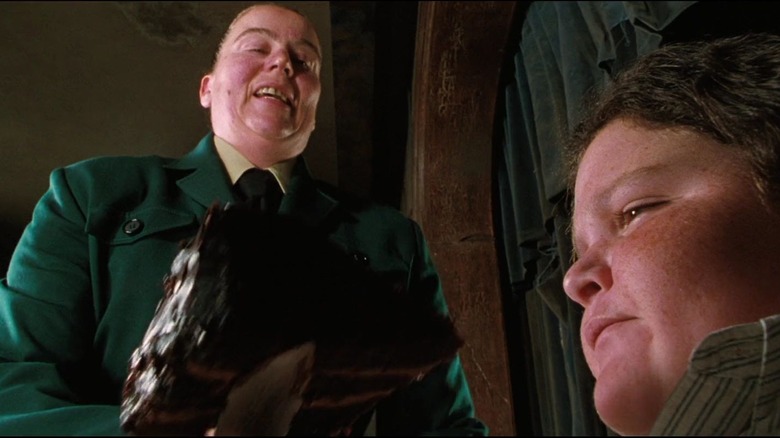The Camera Work In Danny Devito's Matilda Came Directly From The Films Of Tim Burton
By many accounts, Roald Dahl wasn't a very nice person, and it wasn't until I re-read his books for my kids that I realized that his writing had such a mean streak, too. He certainly didn't sugarcoat the world for his younger readers and his magical adventures were filled with neglected kids, bullies of all shapes and sizes, nasty grown-ups, macabre humor, and strange comeuppances. His somewhat bleak view of adulthood was matched by Quentin Blake's scribbly illustrations which highlighted the grotesqueries of his caricatures, such as Aunt Spiker's sharp frame in "James and the Giant Peach," or the general grossness of "The Twits."
Of course, kids have pretty horrible imaginations as well, so it's no wonder Dahl's novels have been cherished favorites for decades. One of his most popular novels, "Matilda," was also one of his last, published just two years before he passed away in 1990. It features some of Dahl's most memorable adult meanies but it is also one of his most uplifting stories; as a shy bookworm, Matilda's commitment to being smart and her eventual happy ending really struck a chord with me when I was growing up.
It's fitting that one of the author's best books provided the source material for one of the finest movie adaptations of his works. Danny DeVito had already shown his affinity for dark comedy with "The War of the Roses" and "Throw Momma From the Train," and his labor of love (he also produced, starred, and narrated) successfully transposed the action from leafy Buckinghamshire in the U.K. to California. To create the film's distinctive look, he turned to a colleague who had shot him so brilliantly as the Penguin in Tim Burton's "Batman Returns. It was a choice that made the story's memorable villains really burst off the screen.
So what happens in Matilda again?
Child genius Matilda (Mara Wilson) has the misfortune to be the daughter of used car salesman Harry Wormwood (Danny DeVito) and his wife Zinnia (Rhea Perlman), an ignorant and materialistic couple with a gaudy fashion sense who neglects her while doting on their oafish son Michael (Brian Levinson). From an early age, Matilda has a prodigious appetite for reading, swiftly graduating from children's books to classic novels at her nearest public library. She wants to go to school but they refuse to enroll her, provoking her to play some pranks on her dad to punish him.
After Harry sells a car to Miss Agatha Trunchbull (Pam Ferris), the child-hating principal of Crunchem Hall Elementary, he decides she's the kind of educator Matilda needs and finally decides to send her to school. Matilda is eager to learn and can't wait, even though she soon finds that Trunchbull has a very particular way of disciplining kids. Luckily, her class teacher is kindly Miss Honey (Embeth Davidtz) who recognizes Matilda's extraordinary potential. Unfortunately, neither the Principal nor Matilda's parents are interested in helping her develop further.
When Miss Trunchbull finds out that the car Harry sold her is faulty, she takes her anger out on Matilda. First, she locks her in "The Chokey," a dark cupboard studded with huge nails, then blames her for putting a newt in her drinking water. Infuriated by the false accusation, Matilda discovers she has telekinetic powers. She hones her newfound gifts and uses them to teach Miss Trunchbull, and her parents, a lesson.
Widescreen was the way to go for DeVito
"Matilda" is a lively and colorful version of the novel and the performances are key to its success. Mara Wilson is delightful as the young hero and Danny DeVito relishes his role as the sleazy Harry Wormwood, paired with his real-life wife Rhea Perlman as his brassy other half. Best of all is Pam Ferris as the monstrous Miss Trunchbull, looming over the kids and quivering with hatred at the very sight of them. It's all so gleefully over the top and DeVito's off-kilter tone compliments that of the book.
The film's visual style is crucial, and DeVito hired cinematographer Stefan Czapsky specifically because of his work with Tim Burton. Czapsky remembered (via Thrillist):
"I had photographed Danny as the Penguin in Batman Returns ... He could have hired anybody who wanted to. He liked the wide-angle photography that was there, [like] Edwards Scissorhands [...] He purposefully created sets in which you could see the ceiling and the background. [Danny] loved being photographed by the [wide-angle] lens. He had a face that actually could take the 10 millimeter. We used it both for Mr. Wormwood and the Trunchbull."
It was an inspired choice as the format really emphasizes the grotesquery of the adult villains. Wearing heavy make-up and a muscle suit, Pam Ferris is shot from low angles to make Trunchbull look even more intimidating, and her bristly face is as big as a planet in the queasy close-ups. DeVito, almost as broad as he is tall, seems to fill the widescreen frame.
"Matilda" flopped when it first came out but has become a beloved family classic that celebrates education over ignorance. It's an important message that I hope my kids, who have probably seen it 20 times already, will pass down if they have children of their own.


